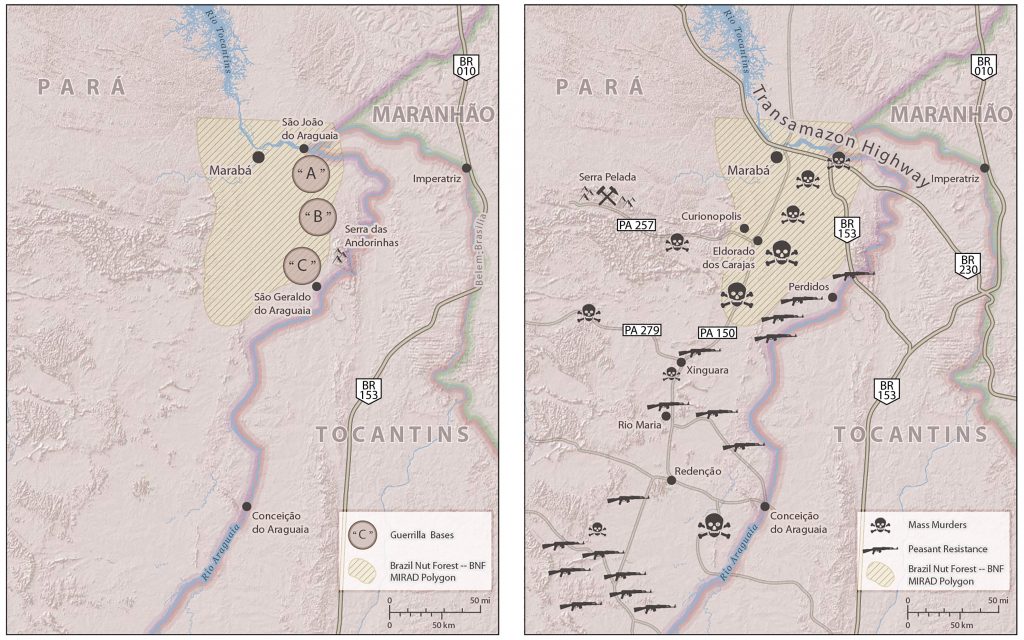 GAINESVILLE, FL – Amazonian deforestation continues to concern the world community, especially as the Initiative for the Integration of the Regional Infrastructure of South America (IIRSA) begins to displace indigenous peoples and traditional communities. While the narrative surrounding the loss of Amazonian ecosystems is often framed as the penetration of capitalist relations into a resource frontier, research carried out by UF’s Dr. Cynthia Simmons and Dr. Robert Walker brings new evidence to light. With a case study of the Brazil Nut Forest (BNF) in the Lower Amazon Basin, they expose how the Brazilian Armed Forces hastened the process of “land creation” in helping develop an agricultural economy, destroying the forest as they waged a dirty war against poverty-stricken peasants and Maoist insurgents. The BNF once formed an integral part of Amazonia’s extractive economy by providing Brazil Nuts to the world market. Rapid conversion, initially driven by fiscal incentives and later by covert militarized assaults, reduced forest cover in the area from 97% in 1973 to less than 14% in 2009. Unless something is done to mitigate the process of “land creation” at basin scale now accelerating under IIRSA, Amazonian forest loss will desiccate the region, killing the economy now replacing the trees.
GAINESVILLE, FL – Amazonian deforestation continues to concern the world community, especially as the Initiative for the Integration of the Regional Infrastructure of South America (IIRSA) begins to displace indigenous peoples and traditional communities. While the narrative surrounding the loss of Amazonian ecosystems is often framed as the penetration of capitalist relations into a resource frontier, research carried out by UF’s Dr. Cynthia Simmons and Dr. Robert Walker brings new evidence to light. With a case study of the Brazil Nut Forest (BNF) in the Lower Amazon Basin, they expose how the Brazilian Armed Forces hastened the process of “land creation” in helping develop an agricultural economy, destroying the forest as they waged a dirty war against poverty-stricken peasants and Maoist insurgents. The BNF once formed an integral part of Amazonia’s extractive economy by providing Brazil Nuts to the world market. Rapid conversion, initially driven by fiscal incentives and later by covert militarized assaults, reduced forest cover in the area from 97% in 1973 to less than 14% in 2009. Unless something is done to mitigate the process of “land creation” at basin scale now accelerating under IIRSA, Amazonian forest loss will desiccate the region, killing the economy now replacing the trees.
Destruction of the BNF provides insight into the development of Amazonia’s agricultural economy. The irony is that this economy, founded on the basis of a massive “land creation” process and fortified by the disciplinary force of Brazil’s military dictatorship, is now vulnerable to continued land creation, the likely result of IIRSA. Brazil’s continued push for economic development, coupled with increasing demands for Amazonian commodities, exacerbates deforestation rates given the need that more land be brought under production. But there is a limit to deforestation beyond which rainfall recycling breaks down, and with it Amazonia’s moist environment. Amazonian agriculture could be destroyed by its very success. The fate of the Amazon is even more uncertain in light of Brazil’s newly elected populist President, Jair Bolsonaro, who advocates a return of military rule. Mr. Bolsonaro has also made clear his intention to abolish environmental regulations, protected areas, and indigenous reserves to clear all obstacles to economic progress, and IIRSA conforms well with his vision for Amazonia’s future.
“Discipline and Develop: Destruction of the Brazil Nut Forest in the Lower Amazon Basin” is published in The Annals of the American Association of Geographers. Funding for the research was provided by the National Science Foundation (Geography and Regional Science), the Inter American Foundation, the Latin American and Caribbean Environmental Economics Program, the University of Florida Department of Geography, and the University of Florida Center for Latin American Studies.
For more information, contact Dr. Cynthia Simmons at cssimmons@ufl.edu and Dr. Robert Walker at roberttwalker@ufl.edu.